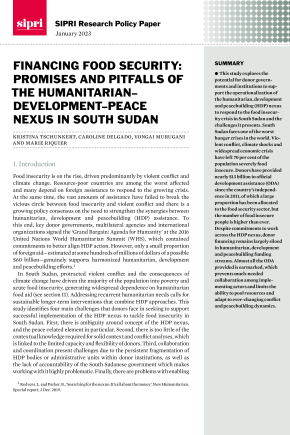Financing Food Security: Promises and Pitfalls of the Humanitarian–Development–Peace Nexus in South Sudan

This study explores the potential for donor governments and institutions to support the operationalization of the humanitarian, development and peacebuilding (HDP) nexus to respond to the food insecurity crisis in South Sudan and the challenges it presents. South Sudan faces one of the worst hunger crises in the world. Violent conflict, climate shocks and widespread economic crisis have left 70 per cent of the population severely food insecure. Donors have provided nearly $13 billion in official development assistance (ODA) since the country’s independence in 2011, of which a large proportion has been allocated to the food security sector, but the number of food insecure people is higher than ever. Despite commitments to work across the HDP nexus, donor financing remains largely siloed in humanitarian, development and peacebuilding funding streams. Almost all the ODA provided is earmarked, which prevents much-needed collaboration among implementing actors and limits the ability to pool resources and adapt to ever-changing conflict and peacebuilding dynamics.
I. Introduction
II. A justification of HDP nexus approaches to food security in South Sudan
III. Donors’ perspectives on the HDP nexus and financing approaches to food security in South Sudan
IV. Ways forward for ensuring food security



